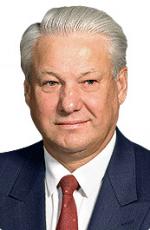Disable ads!
Boris Yeltsin
This article needs additional citations for verification. Please help improve this article by adding citations to reliable sources. Unsourced material may be challenged and removed. (November 2010) Boris Yeltsin Борис Ельцин 1st President of Russia In office 10 July 1991 – 31 December 1999 Prime Minister See list Yegor Gaidar (1992) Viktor Chernomyrdin (1992–1998) Sergey Kiriyenko (1998) Yevgeny Primakov (1998–1999) Sergei Stepashin (1999) Vladimir Putin (1999) Vice President Alexander Rutskoy (1991–1993) Preceded by (Office established) Mikhail Gorbachev as president of the Soviet Union Succeeded by Vladimir Putin Chairman of the Presidium of the Supreme Soviet of the RSFSR In office 29 May 1990 – 10 July 1991 Preceded by Vitaly Vorotnikov Succeeded by Ruslan Khasbulatov (acting) First Secretary of the Moscow City Committee of the Communist Party In office 23 December 1985 – 11 November 1987 Preceded by Viktor Grishin Succeeded by Lev Zaykov Candidate member of the 26th, 27th Politburo In office 18 February 1986 – 24 February 1988 Member of the 26th Secretariat In office 1 July 1985 – 6 March 1986 Full member of the 26th, 27th Central Committee In office 3 March 1981 – 12 July 1990 Personal details Born Boris Nikolayevich Yeltsin Борис Николаевич Ельцин 1 February 1931 Butka, Sverdlovsk Oblast, Russian SFSR, Soviet Union Died 23 April 2007(2007-04-23) (aged 76) Moscow, Russia Nationality Russian Political party Independent (after 1990) Other political affiliations Communist Party of the Soviet Union (1961–1990) Spouse(s) Naina Yeltsina Children Tatyana Borisovna Dyachenko Elena Borisovna Okulova Alma mater Ural State Technical University Religion Russian Orthodoxy Signature Boris Nikolayevich Yeltsin (/ˈjɛltsɪn/; Russian: Бори с Никола евич Е льцин; IPA: [bɐˈrʲis nʲɪkɐˈlaɪvʲɪtɕ ˈjelʲtsɨn] ( listen); 1 February 1931 – 23 April 2007) was a Russian politician and the first President of the Russian Federation, serving from 1991 to 1999. Originally a supporter of Mikhail Gorbachev, Yeltsin emerged under the perestroika reforms as one of Gorbachev's most powerful political opponents. On 29 May 1990 he was elected the chairman of the Russian Supreme Soviet. On 12 June 1991 he was elected by popular vote to the newly created post of President of the Russian Soviet Federative Socialist Republic (RSFSR), at that time one of the 15 constituent republics of the Soviet Union. Upon the resignation of Mikhail Gorbachev and the final dissolution of the Soviet Union on 25 December 1991, Yeltsin remained in office as the President of the Russian Federation, the USSR's successor state. Yeltsin was reelected in the 1996 election, where critics widely claimed pervasive corruption; in the second round he defeated Gennady Zyuganov from the revived Communist Party by a margin of 13%. However, Yeltsin never recovered his early popularity after a series of economic and political crises in Russia in the 1990s. He vowed to transform Russia's socialist command economy into a free market economy and implemented economic shock therapy, price liberalization and privatization programs. Due to the method of privatization, a good deal of the national wealth fell into the hands of a small group of oligarchs. While the few billionaire oligarchs likened themselves to the American "robber barons" of the nineteenth century, no real comparison can be drawn. Rather than creating new enterprises, they played the role of old state trading monopolies, arbitraging the huge difference between old domestic prices for Russian commodities and the prices prevailing on the world market. Much of the Yeltsin era was marked by widespread corruption, inflation, economic collapse and enormous political and social problems that affected Russia and the other former states of the USSR. Within the first few years of his presidency, many of Yeltsin's political supporters turned against him and Vice President Alexander Rutskoy denounced the reforms as "economic genocide". Ongoing confrontations with the Supreme Soviet climaxed in the October 1993 Russian constitutional crisis in which Yeltsin illegally ordered the dissolution of the parliament, which then attempted to remove him from office. In October 1993, troops loyal to Yeltsin stopped an armed uprising by his opponents outside of the parliament building, leading to a number of deaths. Yeltsin then scrapped the existing constitution, temporarily banned political opposition and deepened his economic experimentation. He introduced a new constitution with stronger presidential power and it was approved by referendum on 12 December 1993 with 58.5% of voters in favour.[citation needed] On 31 December 1999, Yeltsin announced his resignation, leaving the presidency in the hands of his chosen successor, then-Prime Minister Vladimir Putin. Described by the BBC as the “flawed founder of Russian democracy”, Yeltsin left office widely unpopular with the Russian population.
 Read more on wikipedia.org Read more on wikipedia.org
 All quotes by Boris Yeltsin All quotes by Boris Yeltsin
 Edit Edit
|

|
|
|
|
|
Background photo by Giuliana
|